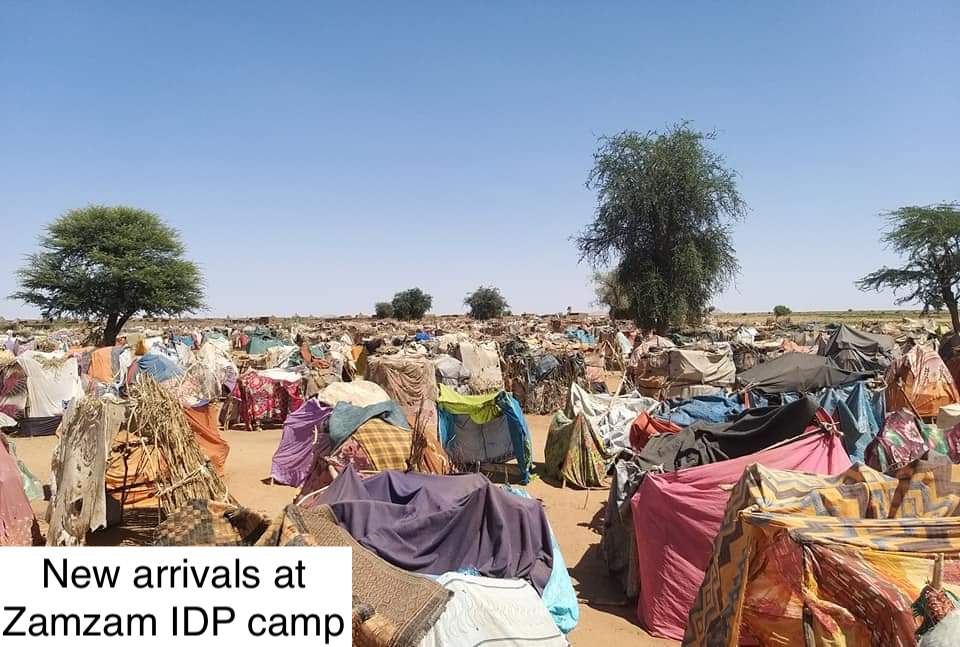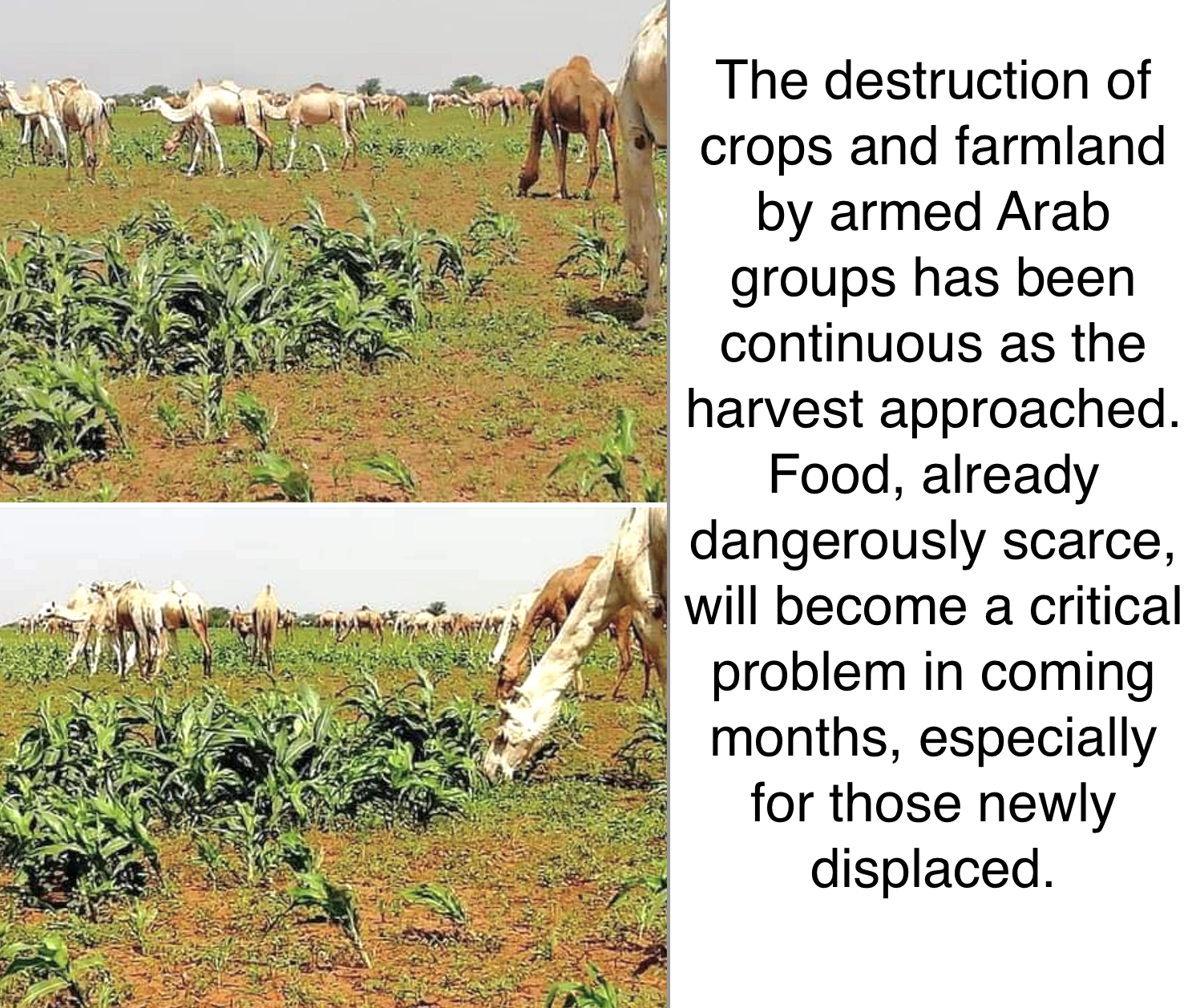Gaffar Mohammud Saeneen and Eric Reeves, Co-Chairs
Julie Darcq, Online Campaign Coordinator
Nancy Reeves, editor and financial facilitator
Although the military coup, and even previous communication breakdowns, prevent a full detailing of the accomplishments of team Zamzam this October, the coordinating counselor has provided the following overview and data:
This report includes and supplements the bimonthly report of 12th of October 2021:
The living conditions is significantly deteriorating fast and there is widespread popular anger in the most of states of Darfur, especially North Darfur. Yesterday we witnessed a massive student demonstration in the capital of North Darfur and the surrounding areas, which led to the closure of most of the main streets, shops, and all public and private places for fear of violence.
The main reason for these spontaneous demonstrations is the hardship of simply living, ever-increasing prices (already extremely high), and the scarcity of basic necessities. This has triggered nationwide anger. In North Darfur there are accumulated frustrations, a primary one is the ruin of the farming season in the state and the failure of the state government to find emergency solutions.
Most of the students, and perhaps the vast majority of those who participated in the demonstrations yesterday, come from many rural areas where the poorest groups live, and several hundred of them walked on foot for hours from the displacement camps such Zamzam and Abu Shouk camp to participate in the demonstrations.
Among the demonstrating students, we met 16-year-old student Zahra Zakaria who walked for two hours with several of her peers all the way from Zamzam camp to participate in the demonstration. And when we asked her why she is here and her reply was:
“Our families are suffering from a scarcity of basic necessities and you will find among us many who haven’t had their breakfast.” She continued, “Many people in the camps are dying slowly from hunger, from diseases, and if this situation continues, there won’t be many left.”
The current living conditions are getting worse day by day, and all indications suggests that the coming months, this crisis may be catastrophic if no program or emergency plans have not been put in place to lift the burden from those who have recently been displaced. Those who are suffering most are the more than 60,000 people who were recently [violently] displaced from the area southwest of El-Fasher.
 Team Zamzam’s distributions to date in October, representing most of the budgeted expenditures; no full account of the number of psychosocial counseling sessions can be communicated at present:
Team Zamzam’s distributions to date in October, representing most of the budgeted expenditures; no full account of the number of psychosocial counseling sessions can be communicated at present:
Distribution of food, sanitary soap, and medicine
October 2021
Distribution of food, sanitary soap, and medicine
Type of basic necessities:
Food: Pasta, sugar, rice, cooking oil, washing soap, and flour
Number of families benefited: 91
Total number of persons benefited: 417
Total cost: $1000
Distributed: sanitary soap and medicine
180 bars of sanitary soap
60 packets of painkillers
Women’s hygiene kits distributed
38 kit boxes (@ $10.74/kit) containing
2 tubes of toothpaste, 2 tubes of shaving cream, 2 razor bundles contains 24 razors inside each, 1 tube of body cream and 6 packet of menstruation cotton contains 12 pieces each.
Number of beneficiaries: 38
Testimony from beneficiaries of hygiene kits Box.
“My name is Sourayia Ibrahim, I’m 19 years old from Zamzam. We came to Zamzam from Tabladiat years ago when I was young. I like to thank sisters from Team Zamzam for helping me and my sisters. For three months now we live happily without any stress. Before that, every month I had to walk all the way to El-Fasher to search for job to support myself and sisters.
“The hardest thing is to find work in El-Fasher, this especially when you are young girl. Our family circumstances force me to do anything that I can put hand onto it. Sometimes I do cleaning and hand-washing clothes in the homes of wealthy people. I even worked in buildings and bricklaying with men. I have done many hard jobs in El-Fasher, but most of the times was cheated with less pay.
“Before three months, I was living in a nightmare of stress. Being the oldest of four sisters and responsible for my younger sisters is not that easy. The burden was that each month I have to provide essential hygienic necessities for all four of us to sustain a healthy lifestyle.
“The most expensive thing of all is the menstruation cotton. This is too expensive in Darfur for many girls who are IDP’s, and it runs out quickly; this is what is forces many young girls to quit school half-way through. The problem here is that men don’t understand how important this menstruation cotton is for the health of their daughters and sisters. The other problem is the social taboo and the stigma that associated with these things.
“Many girls here in Darfur and especially in the camps can’t ask family members to provide them with these essential necessities. Young girls in Darfur generally feel ashamed to ask their family member to provide them these things, but this hygienic cotton is in dire need among the adolescent population. Because of this I quit school two years ago. But I will not allow such simple necessities to prevent my young sisters from attending school. hree months ago, sisters from Team Zamzam provided us four hygienic boxes to share with my sisters and since then we feel much less stress.
“Their provision took away an immense pressure from us and I can’t forget how relieved I’m right now. Some people, and in particular men, may see this as a small problem, but I can certainly say this is not a small issue. This is one of the biggest problems that young girls have been facing for many years. It’s a big problem when one can’t afford to buy a small package of menstruation cotton. It’s even bigger when one cannot ask male family members for this; and it is certainly a bigger problem when young girls are forced to quit school.
“We are not the only ones who are grateful for this help. Many friends from my neighbourhood who benefited from this distribution tell me how relieved they are. I thank you again for bringing hopes and plenty of smiles.”

